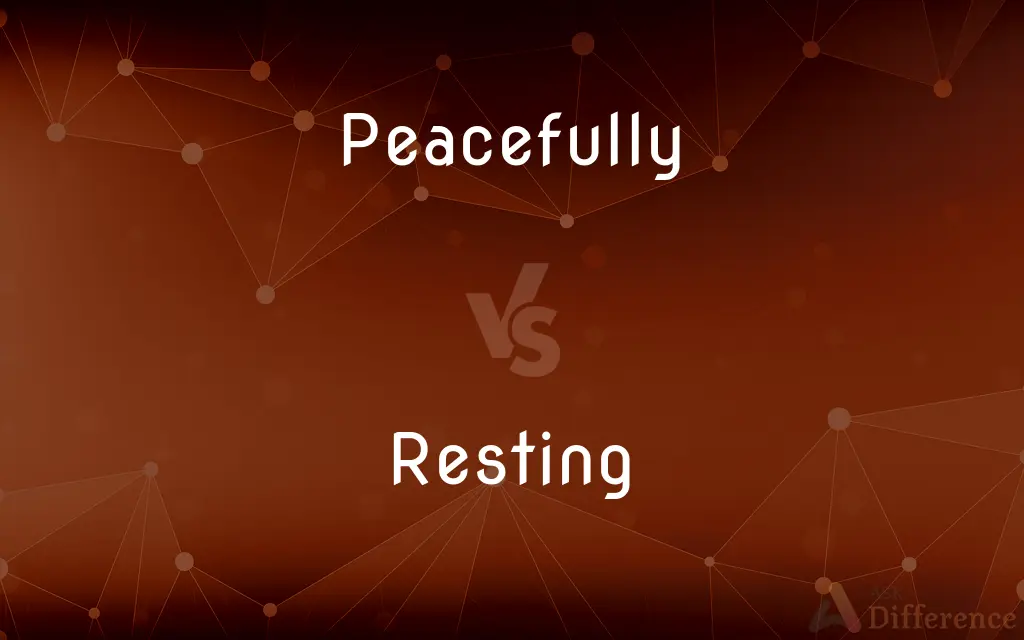Peacefully vs. Resting — What's the Difference?
By Fiza Rafique & Maham Liaqat — Updated on May 17, 2024
"Peacefully" describes a manner of tranquility or calm, while "resting" refers to being in a state of relaxation or repose, often implying a temporary break from activity.

Difference Between Peacefully and Resting
Table of Contents
ADVERTISEMENT
Key Differences
Peacefully" is an adverb that describes actions done in a calm, tranquil, and serene manner. It often conveys a sense of harmony and absence of disturbance, whether in actions, surroundings, or states of being. "Resting" is a verb or adjective that refers to a state of relaxation, repose, or taking a break from activity. It implies a temporary pause to regain energy or composure, often after exertion or work.
"Peacefully" can be used to describe how someone performs an activity, such as sleeping, living, or protesting, emphasizing the serene and undisturbed nature of the action. In contrast, "resting" focuses on the state or act of taking a break, emphasizing recuperation and pause.
In contexts related to sleep, "peacefully" might describe the quality of sleep, suggesting it is calm and undisturbed. Meanwhile, "resting" would simply indicate the act of lying down or pausing, regardless of the quality of sleep or rest.
"Peacefully" often carries an emotional or aesthetic connotation, suggesting a deeper sense of tranquility. "Resting," however, is more functional, indicating a physical state of inactivity without necessarily implying a specific quality of that state.
In narrative and descriptive writing, "peacefully" might be used to evoke a sense of calm and beauty, whereas "resting" provides a straightforward depiction of someone taking a break or being inactive.
ADVERTISEMENT
Comparison Chart
Part of Speech
Adverb
Verb/Adjective
Meaning
In a calm, tranquil manner
In a state of relaxation or repose
Usage Context
Describing actions or states
Describing a state of inactivity
Emotional Connotation
Suggests tranquility and calmness
Suggests a temporary pause
Example Sentence
E.g., "She slept peacefully."
E.g., "He is resting after work."
Compare with Definitions
Peacefully
Without disturbance or conflict.
They resolved their differences peacefully.
Resting
Lying down to recuperate.
She is resting after her surgery.
Peacefully
In a tranquil and calm manner.
The baby slept peacefully through the night.
Resting
Being in a state of relaxation.
He is resting on the couch.
Peacefully
In a way that is free from stress or worry.
She lived peacefully in the countryside.
Resting
Taking a break from activity.
The workers are resting during their lunch break.
Peacefully
Serenely and quietly.
The lake reflected the sky peacefully.
Resting
Occurring during a state of inactivity
A resting pulse.
Peacefully
Harmoniously.
The communities coexisted peacefully.
Resting
(Biology) In a temporary phase of not growing, dividing, or being active
The resting brain.
Resting spores.
Peacefully
Without disturbance; tranquilly
The baby slept peacefully in its cradle
Resting
The action of rest
Peacefully
Without war or violence
The siege ended peacefully
Resting
A place where one can rest; a resting place.
Peacefully
Undisturbed by strife, turmoil, or disagreement; tranquil
A peaceful hike through the forest.
Resting
A pause; a break; an interlude.
Peacefully
Inclined or disposed to peace; peaceable
A peaceful solution to the dispute.
Resting
That rests; that is not in action or in the process of growth.
Peacefully
Not involving violence or employing force
A peaceful protest.
Resting
(euphemism) Unemployed; out of work.
Peacefully
In a peaceful manner.
Resting
Remaining; stationary.
Peacefully
In a peaceful manner;
The hen settled herself on the nest most peacefully
Resting
Present participle of rest
Resting
In a temporary state of inactivity.
The equipment is resting between uses.
Resting
Pausing from exertion.
Athletes need to spend time resting between workouts.
Common Curiosities
Can "peacefully" describe sleep?
Yes, it describes sleep that is calm and undisturbed.
What does "resting" mean?
It means being in a state of relaxation or taking a break from activity.
Can "resting" describe sleep?
Yes, but it more generally refers to the act of lying down or pausing.
Does "resting" imply a temporary state?
Yes, it often implies a temporary pause from activity.
Is "peacefully" an adjective?
No, it is an adverb.
Is "resting" used in technical contexts?
Yes, it can be used to describe machinery or equipment in a state of inactivity.
What does "peacefully" mean?
It means in a calm, tranquil, and undisturbed manner.
Does "peacefully" imply a specific duration?
No, it describes the manner of an action, not its duration.
Can "peacefully" be used to describe non-physical states?
Yes, it can describe emotional or situational calmness.
Can "peacefully" be used in conflict resolution?
Yes, it can describe resolving issues without conflict.
Is "resting" a verb or an adjective?
It can be both; as a verb, it means to relax, and as an adjective, it describes the state of being at rest.
Is "peacefully" used in narrative writing?
Yes, it is often used to evoke a sense of calm and serenity.
Which term is more functional, "peacefully" or "resting"?
"Resting" is more functional, focusing on the physical state.
Which term is more emotional, "peacefully" or "resting"?
"Peacefully" often carries more emotional connotation.
Can "resting" be used metaphorically?
Yes, for example, "resting one's mind" from worries.
Share Your Discovery

Previous Comparison
Phagolysosome vs. Phagosome
Next Comparison
Toroid vs. TorusAuthor Spotlight
Written by
Fiza RafiqueFiza Rafique is a skilled content writer at AskDifference.com, where she meticulously refines and enhances written pieces. Drawing from her vast editorial expertise, Fiza ensures clarity, accuracy, and precision in every article. Passionate about language, she continually seeks to elevate the quality of content for readers worldwide.
Co-written by
Maham Liaqat











































